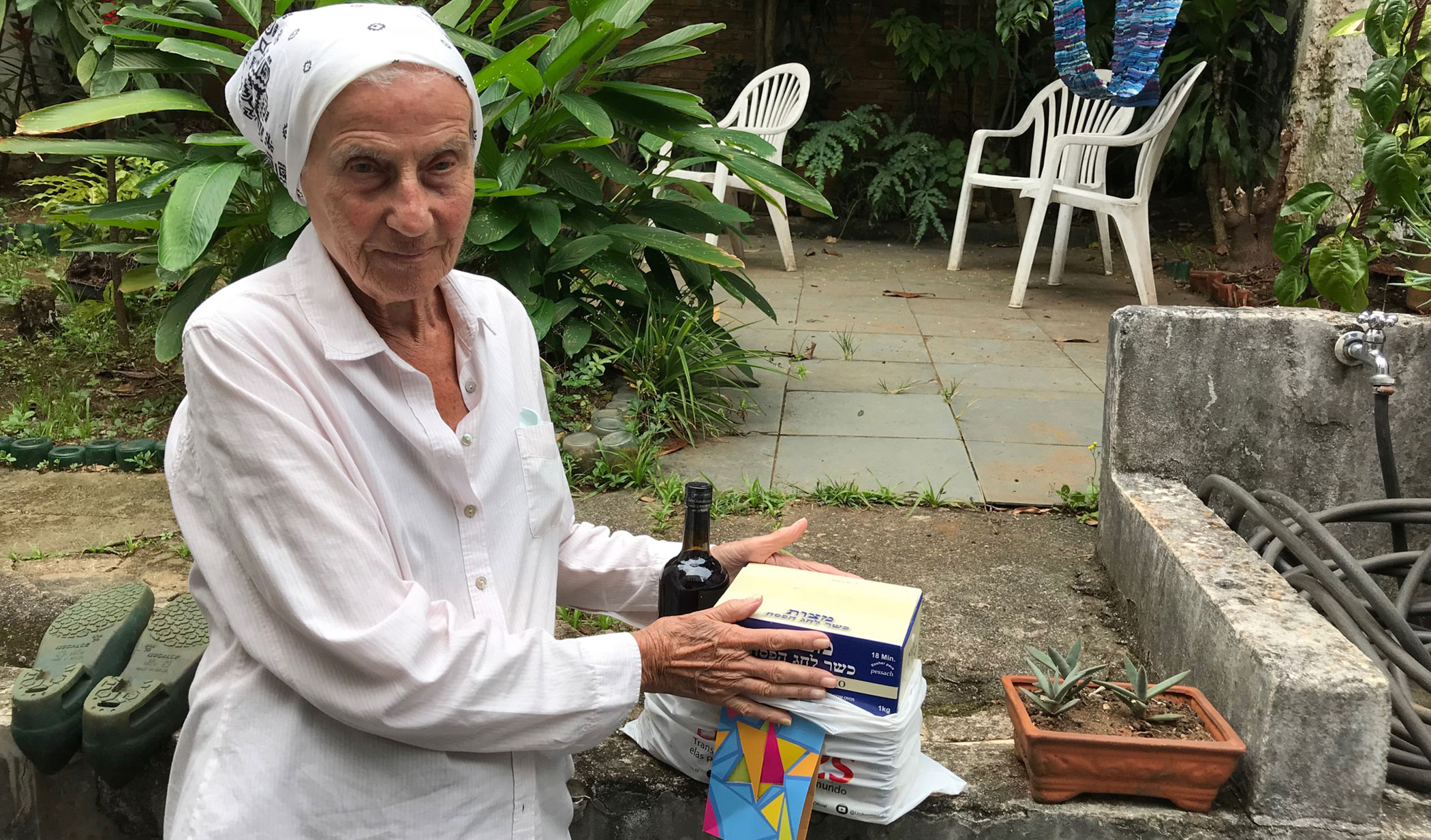Caring for Holocaust Survivors During this Unprecedented COVID-19 Crisis
Claims Conference in the Media | Press Inquiries | Publications | Videos | Updates

We wanted to take this moment to provide an update on the measures being taken during this unprecedented time. The Claims Conference community – lay leaders and staff, as well as our extended family of more than 300 global agencies, comprised of social workers, care managers, home care workers, and so many other stakeholders – is working through this challenging time to ensure consistency of service and the quality of care our survivors have come to expect from us.
Agencies have reported back that survivors are often asking, “why are you calling me so much,” and appreciate the added concern and ongoing devotion. The unflappable reserve we have seen from Holocaust survivors in the midst of even more adversity is a charge for all of us to continue our work in any way possible. In the face of uncertainty, this is a commitment we will continue to fulfill.
Last week, we held a webinar for Claims Conference Board members to outline some of the information we have and get updates from a handful of our agency partners in Israel, North America, the former Soviet Union and Italy. The following is a summary of the updates provided by our partners on that webinar:
Italy
During the webinar we heard from Elena Gemelli, Social Worker, and Ramesh Khordian, Case Manager at the Jewish Community of Milan. Here are some summary points from their updates:
- Because Milan is completely locked down, homecare has become a real challenge. To combat this hurdle, the community is making daily calls to survivors and family members. Calls are being made more frequently in an effort to assess needs as they arise.
- The community has created an emergency call center that has been staffed with doctors and psychologists to assist survivors who may be feeling stressed or need advice over the phone.
- The community has activated new volunteers to deliver food to survivors who are now homebound. Food packages are being left at the door to minimize exposure to survivors.
Israel
During the webinar we heard from Limor Livnat, Chairperson at the Foundation for the Benefit of Holocaust Victims in Israel. Here are some summary points from her update:
- All employees that can work from home are doing so. Essential functions and homecare continue where it is possible. The agency is providing 9 additional weekly homecare hours to 41,000 survivors a month which has been funded jointly by the Claims Conference and the Israeli government.
- Social worker site visits are now being conducted through telephone calls, and are being conducted more frequently in an effort to assess the needs of survivors as they arise. As of the webinar on Monday, the agency had made about 1,000 calls in less than a week and plan to continue in this vein.
- The agency has been monitoring call center operations, finding that the calls are substantially longer than usual as survivors are calling for information on the COVID-19, assistance in their homes and to make other requests. Additional requests are expected to come in for as the situation evolves.
- There are approximately 1,000 additional volunteers who can be activated if they are needed for tasks like food delivery.
Former Soviet Union
During the webinar, we heard from Michal Frank, the Regional Director at the Joint Distribution Committee (JDC) in the former Soviet Union. Here are some summary points from her update:
- JDC is regularly tracking the changes across all 11 countries caring for the nearly 40,000 survivors in their jurisdiction for different regulations, responses and local attitudes toward the virus and different stages of limitations.
- The organization is taking comprehensive measures for the safety of staff, volunteers and the survivors being cared for across the region.
- All employees who can work from home are doing so, and they are prioritizing survivors based on needs. Public transportation is being limited in several countries which is what most of the employees use to get to work and to survivors.
- Face-to-face interactions are being supplemented with telephone calls. Most clients do not know how to use or even have broadband internet. Consequently, the JDC is calling survivors and has mobilized volunteers, training them to make these calls so that contact can be made more frequently with survivors during this critical time. The rapid deployment of hotlines has been activated to allow clients to call into the organization as needs arise.
North America
During the webinar, we heard from Stuart Kaplan, CEO at Selfhelp Community Services of New York. Here are some summary points from his update:
- Selfhelp activated their crisis plan three weeks ago, which guided the agency through a triage of services. Homecare has been prioritized according to the most urgent needs.
- Caseworkers have stopped in-person site visits and are now making calls to survivors instead to minimize survivor exposure and ensure they are identifying needs as soon as they arise
- Selfhelp has increased salaries for some employees, an unprecedented action that will ensure that survivors will receive the services they require during these dynamic times.
The coming weeks undoubtedly will be very difficult for all of us. Circumstances have been changing rapidly, and we will likely circulate further updates as events warrant. For now, we wanted to let you know about some of the things we are doing at the Claims Conference to ensure funding needs are met, and every survivor is cared for.
Staying Connected
We are in regular contact with our agency partners and have asked that they keep us up to date with any significant changes or obstacles resulting from the current events. Homecare, of course, will continue to pose a major concern but is now being addressed through a series of solutions as noted above. Our agency partners continue to investigate fallback solutions enabling them to check in with clients from home should the global situation worsen.
Virtual Office
Globally, almost all Claims Conference staff is now working remotely. The Claims Conference has developed the technological and operational infrastructure for employees to work remotely when circumstances – as they do now – require. This should not interrupt the flow of business. If you need to reach us, the same phone numbers, emails and internal systems are operating as normal.
Compensation activities across the New York, Tel Aviv, and Frankfurt offices continues, and all compensation payments for the over 50,000 survivors who receive direct payments from the Claims Conference can be expected as usual.
We understand that these are unprecedented times, and we want you to know that we are prepared. As we navigate this together with our many partners, you can count on us to be flexible and present.
With wishes that you and yours are in good health, with blessings of Refuah Sh’lemah for any who are sick. We will continue to keep you updated as circumstances warrant.
Sincerely,
Julius Berman
Claims Conference President

